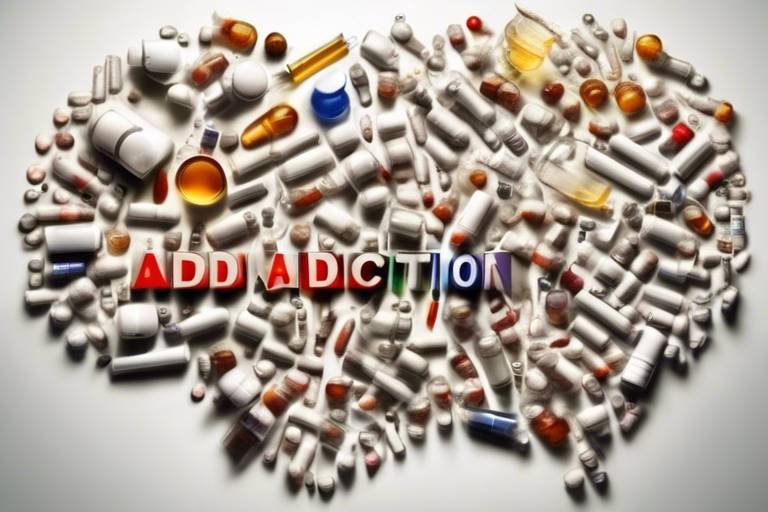The Science of Addiction - Recent Discoveries
Addiction is a complex and multifaceted issue that affects millions of individuals worldwide. Recent discoveries in addiction research have shed light on the intricate interplay of biological, psychological, and social factors that contribute to this pervasive condition. Understanding the science behind addiction not only enhances our comprehension of human behavior but also paves the way for innovative treatment and prevention strategies. In this article, we will explore the latest findings in addiction research, uncovering how these insights can lead to more effective interventions and ultimately help individuals reclaim their lives.
Understanding the brain's chemistry and structure is crucial in addiction research. Recent studies reveal how neurotransmitters and brain circuits are altered by substance use, leading to compulsive behaviors and cravings. For instance, the neurotransmitter dopamine, often referred to as the "feel-good" chemical, plays a significant role in the reward system of the brain. When someone engages in substance use, the brain's reward pathways become hijacked, resulting in heightened feelings of pleasure. Over time, this can lead to a cycle of dependence, where the individual feels compelled to seek out the substance to avoid withdrawal symptoms or to recapture that initial high.
Psychological components, including trauma, mental health disorders, and personality traits, significantly influence addiction susceptibility. For example, individuals who have experienced adverse childhood events may be more likely to develop substance use disorders later in life. Recent findings explore how these psychological factors interact with biological predispositions to affect recovery outcomes. It’s like a recipe where both the ingredients (psychological factors) and the cooking method (biological factors) determine the final dish (addiction). Understanding these interactions is essential for tailoring effective treatment plans.
Genetic predisposition plays a vital role in addiction, with research identifying specific genes linked to substance use disorders. Understanding these genetic factors can inform personalized treatment approaches and prevention strategies. For instance, individuals with certain genetic markers may metabolize substances differently, affecting their likelihood of developing an addiction. This knowledge opens the door to more targeted therapies that take an individual’s genetic makeup into account, much like how a tailor crafts a suit to fit a person's unique measurements.
Epigenetic changes, influenced by environmental factors, can affect gene expression related to addiction. Recent studies highlight how these changes may contribute to the development and persistence of addictive behaviors. Imagine a light switch: genes can be turned on or off based on external influences, such as stress or exposure to drugs. This dynamic interaction between our environment and genetics underscores the complexity of addiction and suggests that interventions could potentially alter these epigenetic markers, offering new hope for recovery.
A family history of addiction increases the likelihood of developing substance use disorders. Recent research emphasizes the importance of familial factors in understanding individual risk and guiding preventive measures. If you think about it, addiction can be like a family heirloom—passed down through generations, not just in terms of genetics but also through learned behaviors and environmental influences. Recognizing this connection can help families break the cycle of addiction and foster healthier environments.
Resilience factors, such as coping strategies and support systems, can mitigate the risk of addiction. Recent studies focus on enhancing psychological resilience as a key component of effective prevention and treatment. This is akin to building a sturdy dam to hold back the floodwaters of addiction; with the right support and coping mechanisms, individuals can withstand the pressures that might otherwise lead them down a path of substance use.
Social environments, including peer pressure and socioeconomic status, significantly impact addiction risk. Recent research underscores the importance of community support and social networks in recovery and prevention efforts. Think about it: the people we surround ourselves with can either lift us up or drag us down. Positive social connections can provide a safety net, helping individuals navigate the challenges of recovery and reducing the likelihood of relapse.
Community-based programs play a crucial role in addressing addiction by providing resources and support. Recent findings highlight the effectiveness of these programs in reducing substance use and promoting recovery. Consider community initiatives that offer mentorship, counseling, and educational resources—these programs can be lifelines for individuals struggling with addiction, offering them the tools they need to rebuild their lives.
Stigma surrounding addiction can hinder individuals from seeking help. Recent studies examine how reducing stigma can improve access to treatment and encourage open discussions about addiction in society. It’s essential to recognize that addiction is a disease, not a moral failing. By fostering a compassionate understanding of addiction, we can create an environment where individuals feel safe to seek help without fear of judgment.
- What are the main causes of addiction? Addiction is influenced by a combination of biological, psychological, and environmental factors.
- Can addiction be cured? While there is no definitive cure, many individuals can achieve recovery through appropriate treatment and support.
- How can I help someone struggling with addiction? Offering support, encouraging them to seek professional help, and educating yourself about addiction can make a significant difference.

The Biological Basis of Addiction
Understanding the biological basis of addiction is akin to peeling back the layers of an onion; each layer reveals more about the complex interplay of brain chemistry and behavior. At the heart of addiction lies the brain's reward system, a network of structures and pathways that are fundamentally altered by substance use. When someone consumes drugs or alcohol, the brain releases neurotransmitters, particularly dopamine, which create feelings of pleasure and reinforcement. This surge of dopamine is what makes substances so enticing, but it also sets the stage for compulsive behaviors. Over time, the brain adapts to these changes, leading to a state where greater amounts of the substance are needed to achieve the same pleasurable effect—a phenomenon known as tolerance.
Recent studies have illuminated how specific brain circuits are disrupted during addiction. For example, the prefrontal cortex, responsible for decision-making and impulse control, often becomes less active, making it harder for individuals to resist cravings. Conversely, areas of the brain that govern reward and motivation become hyperactive, creating a vicious cycle that perpetuates substance use. This duality is what makes addiction not just a choice, but a chronic brain disorder.
Moreover, the biological factors of addiction are not solely limited to brain chemistry. Genetics also play a significant role. Research has identified specific genes that may predispose individuals to addiction, suggesting that some people are more vulnerable due to their genetic makeup. For instance, variations in genes related to the dopamine system can influence how an individual responds to drugs, making them more or less susceptible to developing an addiction. This genetic predisposition can be further complicated by environmental factors, creating a complex web of risk factors that researchers are striving to untangle.
| Factor | Description |
|---|---|
| Neurotransmitters | Chemicals in the brain that transmit signals, crucial in the reward system. |
| Brain Structure | Specific areas of the brain that are altered during addiction, affecting behavior. |
| Genetic Predisposition | Inherited traits that increase the likelihood of developing an addiction. |
| Environmental Influences | External factors that interact with biological predispositions to affect addiction risk. |
As we delve deeper into the biological aspects of addiction, it's essential to recognize that this is not just a personal failure but a complex interplay of various factors. The brain's wiring and chemistry can be profoundly affected by substances, leading to changes that are not easily reversible. Understanding these biological underpinnings can pave the way for more effective treatments, allowing healthcare professionals to develop strategies that target these specific changes in brain function.
In conclusion, the biological basis of addiction is a multifaceted issue that intertwines neurochemistry, genetics, and environmental influences. By comprehending how these elements interact, we can better address the challenges of addiction and work towards more effective prevention and treatment strategies. This knowledge is crucial, not only for those struggling with addiction but for society as a whole, as it fosters a more compassionate understanding of this complex disorder.
- What is the role of neurotransmitters in addiction? Neurotransmitters are chemicals that transmit signals in the brain, and they play a crucial role in the brain's reward system, influencing feelings of pleasure and reinforcement.
- Can addiction be inherited? Yes, genetic predisposition can increase the likelihood of developing an addiction, as certain genes may affect how individuals respond to substances.
- How does the environment influence addiction? Environmental factors, such as social circles and stress levels, can interact with biological predispositions to either increase or decrease the risk of addiction.

Psychological Factors in Addiction
When we think about addiction, it's easy to focus solely on the substances involved or the biological aspects of the brain. However, the psychological factors that contribute to addiction are just as crucial, if not more so. These factors can significantly influence an individual's susceptibility to addiction, shaping their experiences, behaviors, and ultimately their recovery journey. Imagine addiction as a multifaceted puzzle; each piece represents a different aspect of a person's life, including their mental health, past traumas, and even their personality traits.
One of the most significant psychological components is trauma. Individuals who have experienced traumatic events, such as abuse or neglect, often turn to substances as a way to cope with their emotional pain. This coping mechanism can lead to a cycle of addiction that is incredibly difficult to break. In fact, studies show that individuals with a history of trauma are more likely to develop substance use disorders. It’s as if they are trying to silence the echoes of their past with a temporary high, but what they often find is a deeper pit of despair.
Moreover, mental health disorders play a pivotal role in the development of addiction. Conditions such as depression, anxiety, and bipolar disorder can increase the likelihood of substance use as individuals seek relief from their symptoms. The relationship between mental health and addiction is often described as a dual diagnosis, where both issues feed into each other. For example, someone suffering from anxiety may use alcohol to calm their nerves, but over time, this can lead to dependence and exacerbate their anxiety symptoms. This vicious cycle can make recovery feel like an uphill battle.
Personality traits also contribute to addiction susceptibility. Research has identified certain traits, such as impulsivity and sensation-seeking, that can increase the likelihood of engaging in risky behaviors, including substance use. Think of it this way: if someone is naturally drawn to thrill-seeking activities, they may be more inclined to experiment with drugs or alcohol, viewing it as just another form of excitement. Understanding these traits can help tailor prevention strategies and treatment plans that resonate with an individual's unique psychological makeup.
In addition to these factors, social support systems can also play a crucial role in shaping an individual's psychological resilience against addiction. Those with strong support networks—friends, family, or community groups—are often better equipped to handle stress and adversity. It's like having a safety net; when life gets tough, they have people to lean on instead of turning to substances. Recent studies emphasize the importance of fostering these connections as part of effective prevention and treatment strategies.
To summarize, the psychological factors influencing addiction are complex and interwoven, involving trauma, mental health, personality traits, and social support. Understanding these elements is vital for developing effective treatment and prevention strategies. By addressing the psychological aspects of addiction, we can not only help individuals on their path to recovery but also create a more compassionate and informed society.
- What role does trauma play in addiction?
Trauma can lead individuals to use substances as a coping mechanism, increasing the risk of developing addiction. - How do mental health disorders affect addiction?
Mental health disorders can exacerbate substance use, creating a cycle of dependence and worsening mental health symptoms. - Can personality traits influence addiction risk?
Yes, traits such as impulsivity and sensation-seeking can increase the likelihood of engaging in risky behaviors, including substance use. - Why is social support important in recovery?
Strong social support systems can provide individuals with the necessary resources to cope with stress and avoid turning to substances.

The Role of Genetics
When we talk about addiction, it's essential to recognize that it's not just a matter of willpower or personal choice. Genetics plays a significant role in determining who may be more susceptible to developing substance use disorders. Recent research has shed light on specific genes that are linked to addiction, revealing a complex interplay between our biology and behavior. For instance, studies have identified variations in genes related to dopamine receptors, which are crucial for the brain's reward system. These genetic factors can influence how individuals experience pleasure and reward, making some people more vulnerable to addiction than others.
But how does this all work? Imagine your brain as a finely tuned orchestra. Each instrument represents a different neurotransmitter or brain circuit. When addiction strikes, it's as if some instruments start playing out of tune, leading to a cacophony of compulsive behaviors and cravings. This disruption can be traced back to our genes, which dictate how our brains respond to certain substances. For example, individuals with a family history of addiction might carry genetic markers that predispose them to substance use disorders. This doesn't mean that addiction is inevitable; rather, it highlights the importance of understanding these genetic vulnerabilities in crafting effective prevention and treatment strategies.
Furthermore, genetic predisposition doesn't operate in a vacuum. It's crucial to consider how these genetic factors interact with environmental influences, such as stress, trauma, and social circumstances. This interaction can create a perfect storm for addiction to flourish. For instance, someone with a genetic predisposition for addiction who also experiences significant life stressors might be at an even greater risk for developing substance use issues. This underscores the need for a comprehensive approach to addiction treatment that takes both genetic and environmental factors into account.
In the quest for personalized treatment, understanding genetic factors can lead to more tailored interventions. Imagine if we could identify individuals at risk for addiction based on their genetic makeup. This could pave the way for preventive measures that are as unique as the individuals themselves. For example, those with specific genetic markers might benefit from targeted therapies that address their unique vulnerabilities, ultimately leading to better recovery outcomes.
In conclusion, the role of genetics in addiction is a fascinating and complex area of study. It opens up new avenues for understanding how we can better prevent and treat substance use disorders. By recognizing the genetic components of addiction, we can not only improve our approaches to treatment but also foster a more compassionate understanding of those affected by addiction.
- What role do genetics play in addiction? Genetics can significantly influence an individual's susceptibility to addiction by affecting brain chemistry and reward pathways.
- Can addiction be inherited? Yes, a family history of addiction can increase the likelihood of developing substance use disorders due to shared genetic factors.
- How do environmental factors interact with genetics in addiction? Environmental influences, such as stress and trauma, can exacerbate genetic predispositions, increasing the risk of addiction.
- Are there genetic tests for addiction risk? While research is ongoing, some genetic tests may help identify individuals at higher risk for addiction, paving the way for personalized prevention strategies.

Epigenetics and Addiction
Epigenetics is a fascinating field that studies how environmental factors can influence gene expression without altering the underlying DNA sequence. When it comes to addiction, this area of research has opened up a whole new understanding of how our experiences can shape our susceptibility to substance use disorders. Imagine your genes as a set of blueprints for a house. While the blueprints themselves remain unchanged, the way you choose to build that house can vary greatly based on the materials you use and the environment in which you construct it. This analogy perfectly encapsulates the essence of epigenetics in addiction.
Recent studies have shown that various environmental factors, such as stress, trauma, and even nutrition, can lead to epigenetic modifications that affect how genes related to addiction are expressed. For instance, individuals who experience high levels of stress may undergo changes in their epigenetic markers that increase their risk for addiction. These changes can create a vicious cycle: the more stress a person faces, the more likely they are to engage in substance use, which in turn can lead to further epigenetic changes.
Moreover, research has identified specific epigenetic changes associated with different substances. For example, exposure to alcohol or opioids can result in alterations to the expression of genes involved in the brain's reward pathways. This means that someone who has a history of substance use may have a different genetic expression profile than someone who has never used substances, potentially making recovery more challenging.
To illustrate the impact of epigenetics on addiction, consider the following table that summarizes some key findings:
| Substance | Epigenetic Changes | Potential Outcomes |
|---|---|---|
| Alcohol | Methylation of genes involved in dopamine signaling | Increased risk of dependency |
| Opioids | Histone modifications affecting stress response genes | Heightened sensitivity to stress and cravings |
| Cocaine | Alterations in gene expression related to reward pathways | Compulsive drug-seeking behavior |
This understanding of epigenetics emphasizes the need for personalized treatment approaches in addiction recovery. By recognizing that each individual's genetic expression can differ based on their life experiences, treatment providers can tailor interventions that consider not only the biological aspects of addiction but also the psychological and environmental influences. It's like having a customized roadmap for recovery, where the destination is the same, but the route taken varies based on individual circumstances.
In conclusion, the field of epigenetics offers profound insights into the complexities of addiction. It highlights the interplay between our genes and the environment, suggesting that recovery is not just about abstaining from substances but also about understanding and addressing the underlying factors that contribute to addiction. As research continues to unfold, we can hope for more effective prevention and treatment strategies that incorporate these critical epigenetic insights.
- What is epigenetics? Epigenetics is the study of changes in gene expression that do not involve alterations to the DNA sequence itself, often influenced by environmental factors.
- How does epigenetics relate to addiction? Environmental factors such as stress and substance exposure can lead to epigenetic changes that affect an individual's susceptibility to addiction.
- Can epigenetic changes be reversed? Some epigenetic changes may be reversible through lifestyle changes, therapy, and other interventions, but this is an area of ongoing research.
- Why is personalized treatment important in addiction recovery? Personalized treatment considers individual differences in genetics, environment, and experiences, leading to more effective recovery strategies.

Family History and Risk
When it comes to understanding addiction, one cannot overlook the significant impact of family history. Research has consistently shown that individuals with a family background of substance use disorders are at a heightened risk of developing their own addiction issues. This correlation raises a crucial question: why does the family environment play such a pivotal role in addiction susceptibility? To answer this, we need to explore a combination of genetic, environmental, and social factors that intertwine within family dynamics.
First and foremost, it's essential to recognize that genetics can significantly influence the likelihood of addiction. Studies indicate that certain genes may predispose individuals to addictive behaviors, making them more vulnerable when exposed to substances. For example, individuals with a family history of alcohol dependence may carry genetic markers that increase their risk of developing similar issues. This genetic predisposition can act like a loaded gun; while it doesn't guarantee that someone will become addicted, it certainly increases the chances.
However, genetics is just one piece of the puzzle. The environment in which a person grows up also plays a crucial role. Children raised in households where substance use is normalized or where addiction is prevalent may be more likely to adopt similar behaviors. It's like being in a garden where certain plants thrive because of the soil they’re in. If the soil is enriched with negative influences, the likelihood of those plants growing strong increases. This idea extends to psychological factors as well, where trauma or stressors in the family can lead to coping mechanisms that involve substance use.
Furthermore, the social dynamics within a family can impact an individual's risk of addiction. For instance, if a family emphasizes open communication and support, individuals may be better equipped to handle stress and avoid turning to substances. On the other hand, families that lack emotional support or exhibit dysfunctional behaviors may inadvertently push members toward addiction as a means of escape.
To illustrate this complex interplay, consider the following table that summarizes the factors influencing addiction risk related to family history:
| Factor | Description |
|---|---|
| Genetic Predisposition | Inherited traits that may increase susceptibility to addiction. |
| Environmental Influence | Exposure to substance use and addiction behaviors within the family. |
| Psychological Factors | Impact of trauma and stressors that may lead to substance use as a coping mechanism. |
| Social Dynamics | The level of emotional support and communication within the family. |
In conclusion, understanding the factor in addiction is crucial for developing effective prevention strategies. By recognizing these influences, we can create targeted interventions that address both the genetic and environmental aspects of addiction. This holistic approach not only aids in treatment but also fosters a supportive environment that can help mitigate the risks associated with familial addiction patterns.
- What role does genetics play in addiction? Genetics can predispose individuals to addiction, making them more susceptible when exposed to substances.
- How does family environment affect addiction risk? A family environment that normalizes substance use can increase the likelihood of addiction in its members.
- Can psychological factors contribute to addiction? Yes, trauma and stressors can lead individuals to use substances as a coping mechanism.
- What can families do to reduce addiction risk? Families can foster open communication and provide emotional support to help mitigate addiction risks.

Psychological Resilience
Psychological resilience is like a mental trampoline; it allows individuals to bounce back from life's challenges and setbacks. In the context of addiction, resilience plays a pivotal role in determining who may succumb to substance use and who can navigate their way through adversity without falling into the depths of addiction. Recent research has shown that resilience is not just an innate trait; it can be cultivated and strengthened through various strategies and support systems. This means that anyone, regardless of their background or experiences, can develop resilience and improve their chances of recovery.
One of the key components of psychological resilience is the ability to employ effective coping strategies. These strategies can range from simple techniques, like practicing mindfulness and deep breathing, to more complex approaches, such as cognitive-behavioral therapy (CBT). For instance, individuals who learn to challenge negative thought patterns and replace them with positive affirmations are more likely to maintain their sobriety. It's fascinating to think about how our minds can be trained to respond differently to stressors, much like how an athlete trains their body for peak performance.
Moreover, having a robust support system is crucial for fostering resilience. Friends, family, and community members can provide the emotional backing that individuals need during tough times. When people feel connected and supported, they are more likely to seek help when they need it, rather than resorting to substances as a coping mechanism. In fact, studies have shown that individuals with strong social networks are less likely to develop substance use disorders. This highlights the importance of surrounding oneself with positive influences and engaging in community activities that promote well-being.
Interestingly, resilience also involves a certain level of self-awareness. Understanding one's triggers and recognizing when they are feeling overwhelmed can empower individuals to take proactive steps to protect their mental health. For example, someone who knows they tend to reach for alcohol during stressful periods can develop alternative strategies, such as engaging in physical activity or reaching out to a friend for support. This awareness acts as a protective shield, helping individuals navigate through challenging situations without resorting to harmful behaviors.
In summary, psychological resilience is a dynamic process that can be nurtured and developed over time. By focusing on enhancing coping strategies, building strong support systems, and fostering self-awareness, individuals can significantly reduce their risk of addiction. It's a powerful reminder that while we may face obstacles, we also have the capacity to rise above them, much like a phoenix emerging from the ashes.
- What is psychological resilience?
Psychological resilience refers to the ability to adapt and recover from stress, adversity, or trauma. It enables individuals to cope effectively with challenges and maintain their mental health. - How can I build my psychological resilience?
You can build resilience through various methods, such as practicing mindfulness, developing strong social connections, and learning effective coping strategies. Engaging in physical activity and seeking professional help when needed can also enhance resilience. - Why is resilience important in addiction recovery?
Resilience is crucial in addiction recovery because it helps individuals cope with stressors and triggers that may lead to relapse. A resilient mindset can empower individuals to overcome challenges and maintain their commitment to recovery. - Can resilience be learned?
Yes, resilience can be learned and developed over time. With the right support, strategies, and mindset, anyone can enhance their resilience and improve their ability to cope with life's challenges.

Social Influences on Addiction
When we think about addiction, it's easy to focus solely on the individual—their choices, their struggles, and their journey. However, the truth is that addiction is not just a personal battle; it’s deeply intertwined with social influences. These influences can either propel someone toward addiction or help them find their way out. Think of it like a dance; the rhythm of one’s social environment can either lead to a beautiful performance or a chaotic stumble.
One major factor is peer pressure. We’ve all been there, right? Whether it’s the allure of trying a new drink at a party or the temptation to fit in with a group, our social circles can significantly impact our choices. Recent studies reveal that adolescents, in particular, are highly susceptible to peer influences. They are more likely to engage in risky behaviors, including substance use, when surrounded by friends who partake. It’s like a domino effect—one person tries it, and before you know it, the whole group is falling into the same pattern.
Another critical aspect is socioeconomic status. Those from lower socioeconomic backgrounds often face higher stress levels, limited access to healthcare, and fewer resources for positive social engagement. This can create a perfect storm for addiction. Imagine living in an environment where opportunities are scarce, and coping mechanisms are limited. In such cases, individuals may turn to substances as a way to escape their reality. A recent study highlighted that individuals in lower socioeconomic brackets are more likely to experience addiction, showcasing the stark contrast in risk factors across different social strata.
Moreover, the role of community support cannot be overstated. Communities that foster strong support networks can significantly reduce the risk of addiction. When individuals feel connected and supported, they are less likely to resort to substances as a coping mechanism. Community programs that promote healthy activities, provide resources, and encourage open discussions about addiction can serve as a lifeline. For instance, community centers that offer recreational activities and counseling sessions can help individuals build relationships and find healthier outlets for stress.
It's also essential to address the stigma surrounding addiction. Stigma can act as a barrier, preventing individuals from seeking help. Many people fear judgment from their peers or community, which can lead to isolation and worsening addiction. Recent research has shown that reducing stigma can encourage individuals to reach out for support, fostering a more open and understanding environment. When we normalize conversations about addiction, we create a space where individuals feel safe to seek help.
| Social Influences | Impact on Addiction |
|---|---|
| Peer Pressure | Increases likelihood of substance use among adolescents |
| Socioeconomic Status | Higher stress and limited resources lead to increased addiction risk |
| Community Support | Promotes healthy coping mechanisms and reduces addiction risk |
| Stigma | Prevents individuals from seeking help, exacerbating addiction issues |
In conclusion, understanding the social influences on addiction is vital for developing effective prevention and treatment strategies. By addressing these factors, we can create a more supportive environment that encourages recovery and reduces the risk of addiction. Just as a plant needs the right environment to thrive, individuals battling addiction need a supportive community to flourish.
- What role does peer pressure play in addiction? Peer pressure can significantly influence individuals, especially adolescents, to engage in substance use as they seek acceptance from their peers.
- How does socioeconomic status affect addiction risk? Individuals from lower socioeconomic backgrounds may face higher stress and limited resources, increasing their risk of developing addiction.
- Can community support help prevent addiction? Yes, strong community support can provide individuals with healthy coping mechanisms and reduce their likelihood of turning to substances.
- What impact does stigma have on individuals with addiction? Stigma can prevent individuals from seeking help, leading to isolation and worsening addiction issues.

The Impact of Community Programs
Community programs have emerged as a powerful force in the fight against addiction, acting as lifelines for individuals struggling with substance use disorders. These programs are not just about providing resources; they create a supportive environment that fosters recovery and encourages positive change. Imagine walking into a place where everyone understands your struggles, where you can share your story without fear of judgment—this is the essence of community programs.
Recent research has shown that community-based initiatives can significantly reduce substance use and promote long-term recovery. These programs often include a variety of services, such as counseling, education, and peer support, which are tailored to meet the unique needs of individuals. They serve as a reminder that recovery is not a solitary journey; rather, it is a collective effort that thrives on connection and support.
One of the key benefits of community programs is their ability to address the root causes of addiction. Many individuals turn to substances as a way to cope with underlying issues such as trauma, mental health disorders, or socioeconomic challenges. Community programs often incorporate holistic approaches that tackle these issues head-on, providing participants with the tools they need to build healthier lives. For instance, programs might offer:
- Counseling services to help individuals process their experiences and develop coping strategies.
- Educational workshops that inform participants about the dangers of substance use and the importance of mental health.
- Support groups where individuals can share their experiences and learn from one another.
Furthermore, community programs often engage the entire family, recognizing that addiction affects not just the individual but also their loved ones. By involving families in the recovery process, these programs help to rebuild relationships and create a supportive home environment that is crucial for lasting recovery. Families can participate in educational sessions that teach them how to support their loved ones effectively, fostering a culture of understanding and empathy.
Another important aspect of community programs is their focus on reducing stigma associated with addiction. Stigma can be a significant barrier to seeking help, as individuals often fear judgment from society. Community programs work to change this narrative by promoting open discussions about addiction and recovery. They aim to normalize the conversation around substance use disorders, making it easier for individuals to come forward and seek the help they need.
In conclusion, the impact of community programs on addiction recovery cannot be overstated. They provide essential resources, foster supportive networks, and create an inclusive environment that encourages healing. As we continue to advance in addiction research and treatment, it is vital to recognize the role that community-based initiatives play in transforming lives and helping individuals reclaim their futures.
What types of services do community programs offer?
Community programs typically offer a range of services, including counseling, educational workshops, peer support groups, and family involvement programs. These services are designed to address the unique needs of individuals struggling with addiction.
How do community programs help reduce stigma?
By promoting open conversations about addiction and recovery, community programs work to normalize the experiences of those affected by substance use disorders. This helps to shift societal perceptions and encourages more individuals to seek help.
Can family members participate in community programs?
Yes! Many community programs actively involve family members in the recovery process, offering educational sessions and support groups that help families understand addiction and learn how to support their loved ones effectively.

Stigma and Its Effects
Stigma surrounding addiction is a significant barrier that affects millions of individuals struggling with substance use disorders. It’s a bit like walking through a thick fog; you can’t see the path ahead, and often, you feel lost and isolated. This stigma manifests in various forms, from negative stereotypes to outright discrimination, creating an environment where individuals feel ashamed to seek help. Imagine battling a monster in the dark, only to find that the very people who could help you are also the ones who cast judgment on your struggle.
Recent studies have shown that stigma can lead to a range of detrimental outcomes, including increased feelings of shame, lowered self-esteem, and a reluctance to access treatment. When individuals perceive that they will be judged or discriminated against due to their addiction, they are less likely to reach out for support. This creates a vicious cycle where the lack of help exacerbates their condition, leading to further isolation and despair.
Furthermore, stigma not only affects the individuals directly involved but also impacts their families and communities. Families may feel embarrassed or ashamed, leading to strained relationships and a lack of support for the person in need. Communities, too, can suffer; when addiction is stigmatized, it becomes harder to foster open conversations and develop effective prevention and treatment programs. It’s like trying to build a house on a shaky foundation; without a solid base of understanding and support, the structure is destined to collapse.
To combat stigma, it is crucial to promote education and awareness about addiction as a complex disease rather than a moral failing. Here are some effective strategies that can help reduce stigma:
- Education: Providing accurate information about addiction can help dispel myths and misconceptions.
- Personal Stories: Sharing personal experiences can humanize the issue and foster empathy.
- Community Engagement: Involving community members in discussions can break down barriers and promote understanding.
- Advocacy: Supporting policies that protect the rights of individuals with addiction can create a more inclusive environment.
By implementing these strategies, we can create a more supportive environment that encourages individuals to seek help without fear of judgment. Remember, addiction is a disease, not a choice, and everyone deserves compassion and support on their journey to recovery.
- What is addiction stigma?
Addiction stigma refers to the negative attitudes and beliefs that society holds towards individuals with substance use disorders, often leading to discrimination and isolation.
- How does stigma affect recovery?
Stigma can hinder recovery by making individuals feel ashamed to seek help, resulting in lower treatment rates and poorer health outcomes.
- What can be done to reduce stigma?
Education, sharing personal stories, community engagement, and advocacy are effective strategies to combat stigma surrounding addiction.
Frequently Asked Questions
- What is the biological basis of addiction?
Addiction is deeply rooted in the brain's chemistry and structure. Recent research highlights how neurotransmitters, which are the brain's chemical messengers, and specific brain circuits are altered due to substance use. This alteration can lead to compulsive behaviors and intense cravings that make it difficult for individuals to overcome their addiction.
- How do psychological factors influence addiction?
Psychological factors like trauma, mental health disorders, and certain personality traits can significantly affect an individual's susceptibility to addiction. These elements interact with biological predispositions, shaping how an individual responds to substances and their chances of recovery.
- What role do genetics play in addiction?
Genetics is a crucial piece of the addiction puzzle. Research has identified specific genes that are linked to substance use disorders. Understanding these genetic factors can help tailor personalized treatment approaches, making recovery more effective for individuals based on their unique genetic makeup.
- What are epigenetics and how do they relate to addiction?
Epigenetics refers to changes in gene expression that can be influenced by environmental factors. Recent studies suggest that these epigenetic changes may play a significant role in the development and persistence of addictive behaviors, highlighting how our environment can impact our biology.
- How does family history affect addiction risk?
A family history of addiction can increase the likelihood of developing substance use disorders. Research emphasizes the importance of understanding familial factors to better assess individual risk and to guide preventive measures that can help mitigate this risk.
- What is psychological resilience and why is it important?
Psychological resilience refers to the ability to adapt and recover from difficult situations. Factors like effective coping strategies and strong support systems can help reduce the risk of addiction. Recent studies have focused on enhancing resilience as a vital component of both prevention and treatment strategies.
- How do social influences impact addiction?
Social environments, including peer pressure and socioeconomic status, play a significant role in addiction risk. Recent research highlights the importance of community support and social networks, which can significantly aid in recovery and prevention efforts.
- What is the impact of community programs on addiction?
Community-based programs are essential in addressing addiction by providing resources and support to those in need. Recent findings indicate that these programs can effectively reduce substance use and promote recovery, making them a crucial part of the solution to addiction.
- How does stigma affect individuals struggling with addiction?
Stigma surrounding addiction can create barriers for individuals seeking help. Recent studies show that reducing stigma can improve access to treatment and encourage open discussions about addiction, ultimately fostering a more supportive environment for those affected.



















